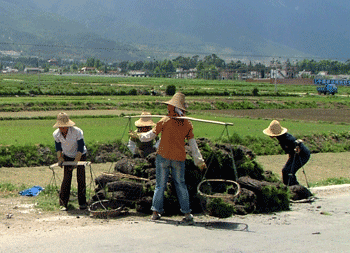Between the Devil and the Deep Red Sea
June 3, 2004
Review of GENERALISSIMO: Chiang Kai-Shek and the China He Lost, by Jonathan Fenby
IT IS sometimes hard to imagine how brutal, desperate, and cruel life was in China in the post-Imperial era, dominated as it was by a gang of competing warlords and bandit leaders trying to get ahead by whatever means at their disposal. It was a primitive state where "everything was possible and permissible in pursuit of power". The better ones were willing to sacrifice thousands in the name of some spurious Big Picture, but they usually had no Big Picture to speak of at all, and were motivated merely by pillage and self-aggrandizement.
In Sichuan Province alone, there were, apparently, as many as 500 battles between fifty generals in just two decades. The heads of opponents were hung from telegraph poles, their families buried alive in pits. Famine and plague were commonplace.
On the evidence of Jonathan Fenby's biography of Chiang Kai-shek, it is also clear how preposterous it was for some observers to believe that China after 1949 might have been measurably better under Chiang, a self-righteous despot surrounded by a clique of self-seekers and spongers. The theory rests on a brief period of relative prosperity and openness in the 1930s, when Chiang had consolidated Kuomintang rule and when the ravages of the Japanese were confined to the distant northeast. Economic liberalization and foreign investment created a climate of hope in coastal regions, but the vast majority of China's population remained desperate.
Fenby does not discourage comparisons between the corrupt Nationalist era and the recent state of the Chinese Communist Party. In fact, he stresses that while the Generalissimo is regarded as the man who "lost China", "Chiang's era in power can be seen in many ways as a precursor of the post-Mao nation." The orthodoxy stresses that three decades or so of Maoist revolution had brutally interceded the movement towards a functioning capitalist economy, but Fenby is overstating his case to suggest that "China is returning to a more normal state which it had previously experienced under the Generalissimo."
If brutality, inequality and squalor constitute normality for China, then Fenby might be correct. Troops were routinely massacred in their thousands during a series of vicious battles with the Japanese or the Communists. Peasants were overtaxed and overworked and generally regarded as expendible by all the big political players.
In one particularly savage battle between the KMT and the CCP in Yunnan, survivors were forced to feed off the rice kernels in the bloody faeces of the victims, or compelled to try to sell their children on the streets, and cannibalsm was rife. The horrors go relentlessly on, and the apogee of chaos and violence was reached during the Japanese attack on the Kuomintang capital of Nanjing in 1937.
Chiang was essentially no better than the warlords he was attempting to displace, but he did have an ideology, a plan for national salvation which basically involved traditional concepts of obedience and respect for leadership, and probably had no chance of winning the support of the peasants. Chiang, imperious to the last, would issue implausible orders from his various redoubts in Nanjing, Xi'an and Chongqing, and they would usually be ignored by those on the ground. Like the stern Father of the Nation he had fashioned himself to be, he was continuously disappointed by his children's disobedience, and their unwillingness to accept that his course was the correct one.
Still, for all Chiang's personal errors, it cannot be disputed that when God was handing out the nations to dictators, Chiang had certainly drawn the short straw. China was undoubtedly a basketcase in the years up to and after the collapse of the Qing Dynasty.
It is in such circumstances that monsters are born, and these pages are, naturally, replete with them.





